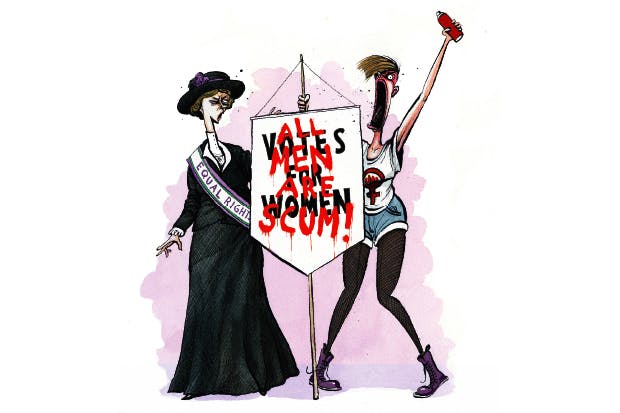Today’s centenary of the Representation of the People Act is in danger of becoming a rose-tinted celebration of votes for women. But it’s worth us remembering this historic legislation with more clarity, so that the anniversary does not get used as an excuse for curtailing democracy once more.
For a start, the Act only extended the franchise to some women – those over the age of thirty, who were occupiers of property or married to occupiers. Younger women still had to wait another decade before they could enjoy the same rights. What’s largely forgotten today is that the 1918 Act newly enfranchised more than five million men, mainly working-class men without property. As a result, the electorate tripled from 7.7 million to 21.4 million with women making up 43 per cent of voters.
Of course, it is thanks to the efforts of the suffragettes that giving the vote to women was on the agenda at all. Over 1000 women were imprisoned, with many going on hunger strike during a sustained fight for suffrage. These brave women deserve all the commemorative concerts, plays, column inches and public debates. Today’s feminists might like to compare themselves to the suffragettes, but they don’t even come close.
The mythology building up around the centenary makes it seems as if suffrage was granted to women as a reward for dropping militancy and getting behind the nation’s war effort. Emmeline and Christabel Pankhurst did urge women to back king and country; they were responsible for giving out white feathers and shaming men who had not signed up. But the idea that democracy was doled out, like sweeties to a reformed child, doesn’t stack up. The majority of women who undertook war work were under 30 and did not get the vote as a thank you.
Back in 1918, a general election, postponed for a decade, could not have been held without a complete overhaul of franchise. An electoral system based primarily upon male property rights was unworkable following the upheavals of the First World War. It was feared that any government elected on such a small mandate would lack legitimacy. So it was partly to shore up the size of the electorate that all men over the age of 21 and eight million women were granted the vote.
The First World War saw working-class men conscripted and subject to military law. They fought and saw their comrades killed, yet had not been able to vote for the government sending them to a potential death. It was inconceivable that millions of returning soldiers would go back to having no say in how their country was governed. What is truly significant about the Representation of the People Act was that, for the first time, franchise was separated from property. The right to vote became a personal right, inherent in the individual.
But suffrage was no more a reward for well-behaved working-class men than it was for good women. The establishment, having watched in horror as revolution occurred in Russia, worried that men politicised through the experience of war would foment revolution at home. These fears were not ungrounded. In the years before the First World War there had been a huge upsurge in the number of unofficial strikes. Trotsky wrote that, ‘the vague shadow of revolution hovered over Britain in those days.’ This fear of social unrest, and perhaps even of revolution, drove the expansion of democracy. The ruling class gambled it was better to have people casting votes than building barricades.
The Representation of the People Act was a victory for working-class men and some women. It dealt a blow to an establishment used to ruling unchecked. But it can seem as if today’s establishment is all too nostalgic for a time when it could rule without having to be accountable to the electorate. Today, tragically, the centenary of the Act is being used to justify calls to restrict democracy. Theresa May has argued politics needs to be made more female-friendly by curtailing the intimidation of MPs. Yet I’m convinced Sylvia Pankhurst for one would have defended the right to protest and balked at the idea that women need special protections in order to engage in politics. Meanwhile, Emily Thornberry’s argument that votes should be given to 16 years-olds smacks of rewards for good children likely to back Labour.
Despite all the electoral reforms, the practice of ‘plural voting’, whereby people with a university degree could vote twice, was actually expanded in 1918. Not just graduates of Oxford and Cambridge but those who had attended provincial universities could also vote in the constituency where they were resident and where they went to university. Similarly, people with business premises in another constituency could vote twice too. This expansion was a deliberate move to prevent the submerging of more wealthy and more educated voters by the newly enfranchised masses. The response some academics have shown to the outcome of the EU referendum suggests this is an anti-democratic practice some would quite clearly like to see rehabilitated.
The Representation of the People Act deserves celebrating because it allowed citizens who had previously had no say in who ruled over them to have a voice. As the vote for Brexit demonstrated, democracy has the ability to turn society on its head. This is both wonderful and dangerous. But it’s completely lost in the warm glow of the current ‘Votes for Women!’ celebrations.







Comments